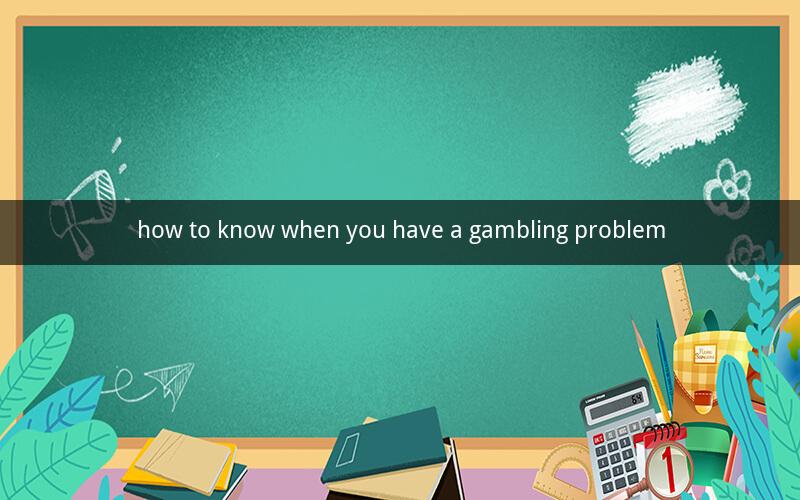
How to Know When You Have a Gambling Problem
Table of Contents
1. Understanding the Definition of a Gambling Problem
2. Identifying Common Signs and Symptoms
3. The Psychological Impact of Gambling
4. The Social and Financial Consequences
5. Recognizing the Warning Signs
6. Seeking Support and Resources
7. Professional Help: Therapies and Counseling
8. Self-Assessment Tools and Resources
9. Building a Support System
10. The Importance of Recovery and Sobriety
---
1. Understanding the Definition of a Gambling Problem
Gambling, when enjoyed responsibly, can be a form of entertainment. However, when it becomes a problem, it can disrupt the lives of individuals and their loved ones. To determine if you have a gambling problem, it's crucial to first understand the definition. A gambling problem is characterized by the inability to control or stop gambling despite negative consequences.
2. Identifying Common Signs and Symptoms
The signs and symptoms of a gambling problem can vary from person to person. However, some common indicators include:
- Preoccupation with gambling
- Lying about gambling activities
- Borrowing money to fund gambling
- Neglecting personal responsibilities due to gambling
- Feeling a need to increase the amount of money bet to achieve the same thrill
3. The Psychological Impact of Gambling
Gambling can have a significant psychological impact on individuals. Some may experience heightened stress levels, depression, or anxiety as a result of their gambling behavior. Others may struggle with substance abuse, self-esteem issues, or have difficulty forming and maintaining relationships.
4. The Social and Financial Consequences
Gambling problems often lead to social and financial difficulties. These may include:
- Strained relationships with family and friends
- Loss of employment
- Homelessness or eviction
- Debt and financial ruin
5. Recognizing the Warning Signs
Warning signs of a gambling problem can manifest in various ways. They include:
- Inability to control gambling
- Feeling restless or irritable when not gambling
- Relieving negative emotions through gambling
- Risking more money than intended
- Chasing losses
6. Seeking Support and Resources
If you suspect that you or someone you know has a gambling problem, seeking support is vital. Many resources are available to help individuals struggling with gambling addiction, including:
- Support groups
- Counseling services
- Hotlines and helplines
- Online forums and communities
7. Professional Help: Therapies and Counseling
Professional help can provide individuals with the tools and support they need to overcome a gambling addiction. Therapies such as cognitive-behavioral therapy (CBT), motivational interviewing, and family therapy are effective in treating gambling problems.
8. Self-Assessment Tools and Resources
Self-assessment tools can help individuals determine whether they may have a gambling problem. Resources such as online quizzes and self-help guides can provide insights into gambling behavior and its impact on one's life.
9. Building a Support System
Creating a support system is crucial for those struggling with a gambling problem. This may include:
- Family members and friends who are supportive
- Joining a support group
- Engaging in alternative activities to replace gambling
10. The Importance of Recovery and Sobriety
Recovery from a gambling problem is a long-term process that requires dedication and commitment. Sobriety from gambling means being able to manage one's behavior and avoid the negative consequences that come with excessive gambling.
---
Questions and Answers
1. What is the first step in identifying a gambling problem?
- Recognizing that there may be an issue is the first step. Look for signs of preoccupation, lying, or neglecting responsibilities.
2. Can a gambling problem lead to psychological issues?
- Yes, it can cause stress, depression, anxiety, and can be associated with substance abuse and self-esteem issues.
3. How can professional help aid in treating a gambling problem?
- Professional help can provide tailored support, including therapy, counseling, and resources for recovery.
4. Are there any free resources available for individuals with gambling problems?
- Yes, many support groups, counseling services, and hotlines are available at no cost.
5. What role does social support play in the recovery process?
- Social support is crucial for emotional and practical assistance during recovery.
6. How can self-assessment tools help in recognizing a gambling problem?
- Self-assessment tools can provide insights into gambling behavior and its impact on one's life, often leading to a more informed decision about seeking help.
7. Is it common for those with gambling problems to lie to others?
- Yes, lying is a common sign of a gambling problem, as individuals may try to hide their activities and the extent of their addiction.
8. What are the financial consequences of a gambling problem?
- Financial consequences can include debt, loss of employment, and financial ruin.
9. Can family therapy be beneficial for individuals with gambling problems?
- Yes, family therapy can help repair strained relationships and provide a supportive environment for recovery.
10. How long does recovery from a gambling problem typically take?
- Recovery can vary greatly from person to person, but it is a long-term process that requires continuous effort and support.